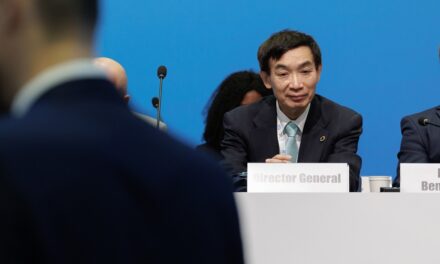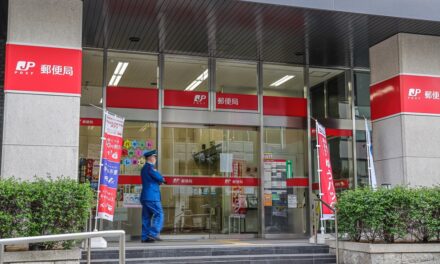
Postal Union hopes to use new delivery project early next year
Q-Post chairman al-Ali with UPU and other delegates at the meeting of the interim working group in Doha yesterday
Members of the quality steering committee of the Universal Postal Union (UPU) expressed confidence that the radio frequency identification project (RFID), aimed at improving the quality of postal delivery, would be successfully implemented in several countries across the world, most probably by early next year.
Experts, associating with the UPU’s initiative, are currently in Doha as part of the global monitoring system’s (GMS) interim working group’s third meeting in the city. The meeting will conclude tomorrow.
As part of the project, meetings are scheduled to be held also in Washington, Rio De Janerio, Lisbon, Botswana, Helsinki, and Japan. Some of the meetings have already been completed.
He said the core group had come out with some effective solutions which he said could be beneficial to all UPU members, in particular those in the developing world.
Jan Sertons (TNT, The Netherlands), Kai Perasalo (Itella, Finland), Antonio Caeiro, (UPU, Portugal) and Sakae Kamibayashi (Japan Post Service) are among the experts attending the meeting.
Q-Post chairman al-Ali with UPU and other delegates at the meeting of the interim working group in Doha yesterday
MEMBERS of the quality steering committee of the Universal Postal Union (UPU) expressed confidence that the radio frequency identification project (RFID), aimed at improving the quality of postal delivery, would be successfully implemented in several countries across the world, most probably by early next year.
Experts, associating with the UPU’s initiative, are currently in Doha as part of the global monitoring system’s (GMS) interim working group’s third meeting in the city. The meeting will conclude tomorrow.
As part of the project, meetings are scheduled to be held also in Washington, Rio De Janerio, Lisbon, Botswana, Helsinki, and Japan. Some of the meetings have already been completed.
Describing the Doha meeting as one of the important events before the RFID’s eventual implementation, Q-Post chairman Ali Mohamed al-Ali said as part of the project, several rounds of detailed discussions involving experts had already been held in the last nine months.
He said the core group had come out with some effective solutions which he said could be beneficial to all UPU members, in particular those in the developing world.
Describing the project as a bold exercise by the UPU to be honest with the customers, al-Ali said using a chip, tagged to mail bags, their delivery would be tested, through electronic gates and its results would be known to all parties involved from dispatch and delivery, once the process was completed. Expressing confidence that the RFID would significantly improve postal delivery in most parts of the world, the Q-Post chairman reminded that under the project there was provision to award as well as penalise the parties concerned. “While there is a provision for earning more money for timely delivery, defaulters could be penalised for delaying in both dispatch and delivery.
“Efforts are still on to make available the chip developed for the whole process at much lower prices than what it had been when it was initially developed,” said al-Ali. This is done bearing in mind the necessity of delivering the services at prices affordable to all countries, especially those in the developing world, he said.
Recalling the efforts made by Q-Post as part of the project involving the UAE, Qatar and Saudi Arabia to test the quality of delivery of mails among themselves using the chip, al-Ali said its successful implementation had given the member-countries a lot of hope about its wider implementation worldwide.
The UPU’s service quality co-ordinator Akio Miyaji said since the quality monitoring system was applicable to all member-countries, no one could run away from their responsibilities in ensuring quality service.
Earlier, while introducing the subject, adviser to Posten, the national postal service of Sweden, Lars Vesterlund said the points derived from the ongoing meeting would be evaluated extensively when the UPU plenary session will be held in November 10 in Berne. “As a result, the Doha meeting assumes enormous significance and the advances made from here would be subjected to detailed UPU evaluation at its November meeting,” said Vesterlund.
Jan Sertons (TNT, The Netherlands), Kai Perasalo (Itella, Finland), Antonio Caeiro, (UPU, Portugal) and Sakae Kamibayashi (Japan Post Service) are among the experts attending the meeting.












